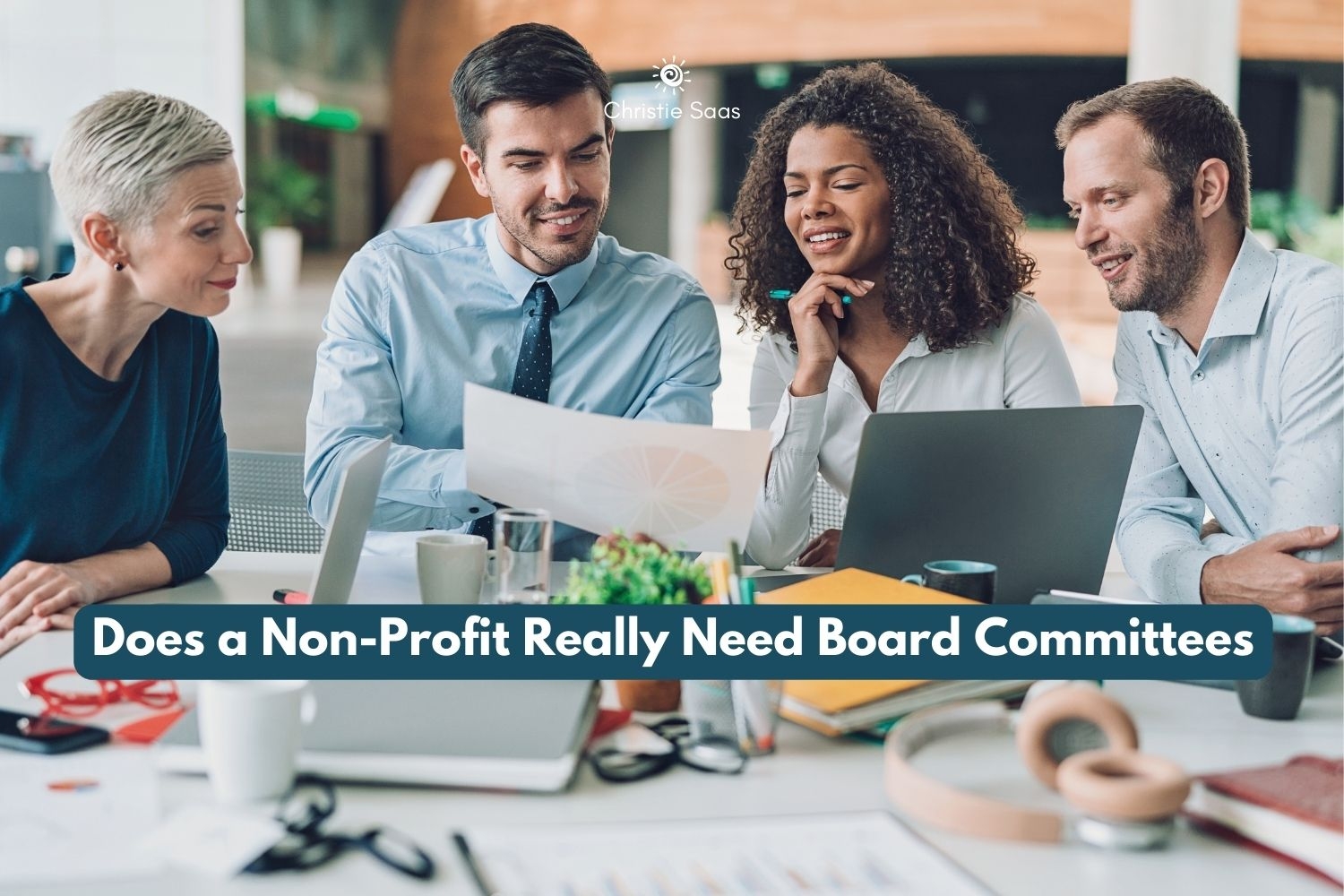Does a Non-Profit Really Need Board Committees

Sometimes, a non-profit board of directors has more work than the time at a regular board meeting will allow. It might be board recruitment, or drafting policy changes, or even working with a facilitator to plan board training. That’s when board committees step in.
A board committee is created when work needs to be done away from the board table but is later brought back to a formal meeting for approval and next steps. That leads to the question when it comes to board committees is why can’t a committee make its own decisions? Why does the committee always have to bring all matters back to the board for approval?
A non-profit board operates as a single entity. No individual board member has the authority to make a decision on behalf of the board. That’s why the board has meetings – to do the work together.
The success of a board committee hinges, in part, on understanding what is and what is not a board committee.
What IS a board committee?
A board committee is a group of board members (not the whole board), and possibly the executive director, that is given a specific task to complete for the board. That work, or the information gathered, is then brought back to the board, perhaps with recommendations, for the board to review and make any formal decisions.
Board recruitment is probably the most common board committee. The whole board will look for potential new members. A collective list will be discussed at a board meeting and then a short list will be turned over to a Board Nominations Committee to approach potential nominees. The resulting list of applications will then be brought back to the whole board for approval.
What ISN’T a board committee?
Any board committee making final decisions on behalf of the board, without having those decisions approved by the whole board, is not a board committee. It is basically a groups of rogue board members.
Executive Committees are probably the most common false board committee. They often make decisions away from the board table under the guise of getting the work done to lighten the load at a regular meeting. Remember, only the board, as a whole, has the power to make decisions, and those decisions must be made at a legally called board meeting with quorum. Any smaller group thinking they can operate with the power of the board, away from a legal meeting, is putting the non-profit at risk.
What is the executive director’s role on board committees?
As the executive director of a non-profit, much of our work is to support the board of directors. The executive director is often an ex officio member of the board and will usually sit on all board committees for a few reasons. The executive director will have more historical knowledge of the non-profit and can bring relevant information to discussions. The executive director is also responsible for all operational matters and can provide operational support to any work a committee needs to undertake, such as accessing online survey software or member listings.
The executive director sits on the board committees as an equal, however, and is not simply an administrative assistant to the committee. Many committees forget this piece and either try to bully the executive director to turn over access to operational tools, or simply ignore the executive director and try to duplicate their own operational tools, sometimes at the non-profit’s expense.
Working together.
It is critically important for board committees, the executive director, and the board as a whole, to understand their roles and to understand who works for whom. When the relationship between board members and the executive director is amicable, a quick discussion at a formal board meeting will result in an easy agreement to work together.
The situation become much more difficult when the relationship between board members and the executive director is not harmonious. In these situations, a more thorough discussion, at a formal board meeting, along with referencing policy, will be needed to set-up the exact details of how much support the staff team will provide to a board committee.
A well-governed non-profit.
Non-profit board committees are not required, so, when they are created, they are expected to help lighten the work of the board. Sometimes a board committee can take their work a little too far, making decisions that board hasn’t approved, or committing to agreements the board hasn’t vetted. This can result in budgets that are not followed, and financial commitments a non-profit will have difficulty honoring. An unmonitored board committee can be a liability for a non-profit.
A non-profit board committee that works in close contact with the rest of the board of directors, respecting approval processes, and working cooperatively with the executive director, can be a blessing. Given a clear job, they can lighten the workload of the board, handle important research collection, and become a strong support to the governing job of the board. A successful board committee can be instrumental in a well governed non-profit.
How to get started.
If your non-profit hasn’t used board committees before and is wondering if it is right for you, look first at the length of your board meetings. If board meetings often run long (longer than 2 hours) or the board struggles to get through the agenda items, you might be able to lighten the workload by creating board committees.
Here are a few board committees to consider:
- Governance: monitors compliance with governing policies, researches and suggests updates, often runs the AGM.
- Fundraising: works very closely with the staff team to raise funds for the non-profit.
- Finance or Finance/Audit: reviews monthly financial reports, presents highlights at the meeting, supports the executive director in the annual audit, presents annual financials at the AGM.
- Nominations: facilitates the development of a shortlist of potential board nominees, invites nominees to join and answers questions, runs the election at the AGM.
- Executive Director Succession: from advertising to interviews and hiring, this committee facilitates the selection of a new executive director when needed.
- Ad-Hoc: other committees as needed.
What committees does your board have? I’d love to know what works for your group. Please use the form on the right side of the page to let me know.
-Christie
…
Hi, I'm Christie Saas, former board member, current Executive Director, and non-profit volunteer. I remember well, those early years when I lacked the training, the confidence, and the work-life balance to focus on becoming the best non-profit leader I could be.
Fast-forward past many bumps in the road, lessons learned, and you’ll find me still in the trenches, but a little wiser, a little calmer, and a whole lot happier. I love my work and I want to help you love yours too.
I created ChristieSaas.com so non-profit leaders never need to feel alone. I’m here to help. If you’re a brand-new non-profit leader, or a little more seasoned, someone who’s looking to make a meaningful contribution and still have time for a full life away from the job, you’re in the right place.
© Christie Saas 2023 All Rights Reserved
…
Want to learn more?
Start with one of my free resources.


